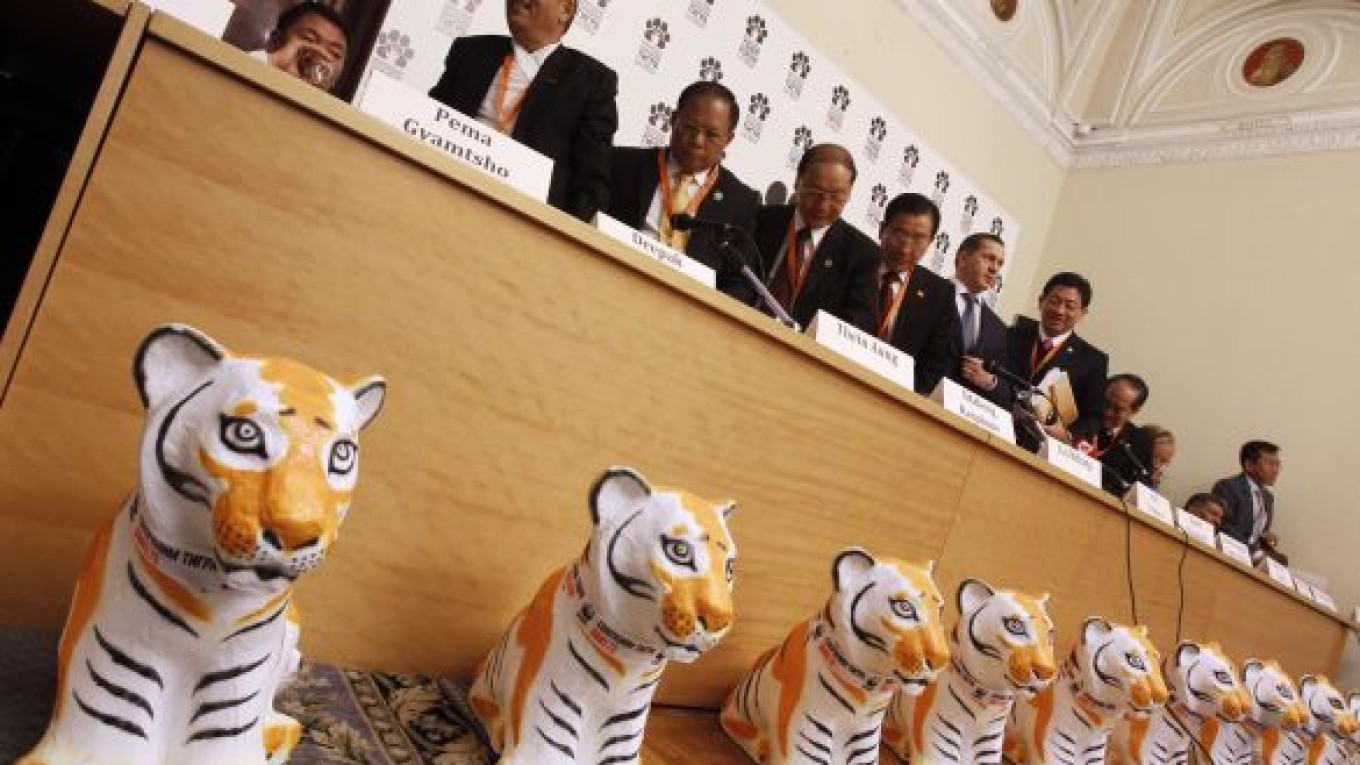ST. PETERSBURG — With just 3,200 tigers left in the wild, top politicians from 13 countries where the big cats still roam gathered Sunday for the St. Petersburg Tiger Forum to discuss a $330 million plan to save the species.
The event, which runs through Wednesday, is hosted by Prime Minister Vladimir Putin. The prime ministers of China, Nepal, Bangladesh and Laos also are attending, and ministers represent the other countries — Bhutan, Cambodia, India, Indonesia, Malaysia, Myanmar, Nepal, Thailand and Vietnam, said a spokesman for Russia’s Natural Resources and Environment Ministry.
The wild tiger population has plummeted 97 percent from 100,000 a century ago, and three subspecies — Bali, Javan, and Caspian — have become extinct. The figure has shrunken by an estimated one-third since 1998 despite conservation efforts.
The main problem is rampant poaching, with animals being killed for their skins as well as body parts, which are used in China as traditional medicine and aphrodisiacs.
A study by the World Wildlife Fund and wildlife trafficking watchdog Traffic released this month said more than 1,000 tigers have been killed by poachers over the past decade, with an average of 104 to 119 animals a year. The study said the real figure was probably much higher.
“With parts of potentially more than 100 wild tigers actually seized every year, one can only speculate what the true number of animals being plundered is,” said Pauline Verheij, author of the report, The Associated Press reported.
In Russia, only 300 to 400 wild Siberian Amur tigers remain, according to the International Fund for Animal Welfare. A tiger was shot dead last Monday in the Primorye region, and the hunters were detained the next day, Interfax reported.
Another menace for the tigers is loss of habitat as wildlife areas shrink because of deforestation caused by timber production and the spread of plantations producing tea, rubber and palm oil. The development of infrastructure across wild areas also splits up tiger populations, making them more vulnerable.
If no action is taken, tigers could become completely extinct by 2022 — ironically, the next Year of the Tiger in the Chinese lunar calendar, James Leape, director general of the World Wildlife Fund, said at the Tiger Forum on Sunday, AP reported.
But the forum's organizers hope to reverse the trend, doubling the population in 12 years. Natural Resources and Environment Minister Yury Trutnev pledged Sunday to boost Russia's population of Amur tigers to 500 by 2020, Interfax reported.
“The issue of the declining tiger population is global and cannot be solved without cooperation,” Barney Long, a tiger program manager for WWF in the United States, said in an interview before the forum. "We think that the chances of success are good and that the global tiger recovery program will be endorsed."
A draft of the program, to be approved at the forum, estimates the cost of saving the species at $330 million over the next five years, with about a third of the sum to be spent on anti-poaching measures.
The forum will also discuss strengthening legislation and law enforcement and reinforcing the management of protected wildlife areas, said Andrei Kushlin, World Bank program coordinator for the Global Tiger Initiative international alliance.
“Law enforcement is a problem in every park of every country,” Long said. “Criminals are extremely well organized and equipped, which is not the case for many of the protected areas.
“It is not unusual to see rangers patrolling huge territories on bicycles armed with weapons dating from the 1920s, while poachers have GPS technology and brand new vehicles,” he said. "More effort, more people, and more equipment — including sometimes very basic things like camping materials — are urgently needed."
The program would also include measures to curb demand for tiger parts, in particular through advertising campaigns to raise public awareness, Kushlin said.
An important win was scored last week by the Traffic group when it reached a preliminary agreement with Myanmar's Wa ethnic minority to close their markets, a notorious hot spot for wildlife trafficking, AP reported.
Putin has paid personal attention to the tigers' plight in the past, shooting a female tiger with a tranquilizer gun during a trip to a wildlife preserve in 2008 to place a transmitter on the animal's neck.
He was also presented with a 2-month-old female Siberian tiger for his birthday that year, but later he gave her to a zoo.
Despite the severity of the situation, Leap of the WWF voiced optimism about the prospects of the species' survival. "The good news about tigers is that they are cats," he said, "and that means that if you protect them, if you provide them space and food, meaning prey, they will come back: They are prolific breeders."
A Message from The Moscow Times:
Dear readers,
We are facing unprecedented challenges. Russia's Prosecutor General's Office has designated The Moscow Times as an "undesirable" organization, criminalizing our work and putting our staff at risk of prosecution. This follows our earlier unjust labeling as a "foreign agent."
These actions are direct attempts to silence independent journalism in Russia. The authorities claim our work "discredits the decisions of the Russian leadership." We see things differently: we strive to provide accurate, unbiased reporting on Russia.
We, the journalists of The Moscow Times, refuse to be silenced. But to continue our work, we need your help.
Your support, no matter how small, makes a world of difference. If you can, please support us monthly starting from just $2. It's quick to set up, and every contribution makes a significant impact.
By supporting The Moscow Times, you're defending open, independent journalism in the face of repression. Thank you for standing with us.
Remind me later.


